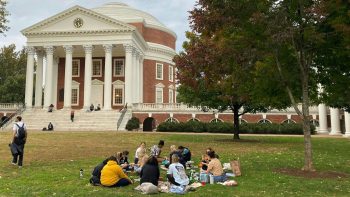TEXT OF INTERVIEW
Kai Ryssdal: Senators John Kerry and Lindsey Graham say they’ll unveil their new climate change bill by next week sometime. But between health care and financial reform and a Supreme Court nomination, it could get kind of lost in the shuffle.
Environmentalist and author Bill McKibben says it’s already too late to prevent global warming. What we have to do now is find a way to cope with our new reality. His new book is called “Eaarth: Making Life on a Tough New Planet.” Bill, it’s good to talk to you.
Bill McKibben: As always, Kai.
Ryssdal: This book, for those who can’t see it out there, the title is “Eaarth” with the unconventional spelling of e-a-a-r-t-h. Help me out there.
McKibben: The conceit is that we really have built a new planet. Substantially different enough from the one that we were born onto to warrant a new name. This earth that we live on now has 5 percent more moisture in the atmosphere than the one 50 years ago. Its oceans are turning steadily acid. We’re seeing dramatic increases both in drought and in deluge, enough so that we’ve really begun to alter not only the ecological fabric of the planet but the economic fabric as well.
Ryssdal: It kind of feels on a day-to-day basis like the same old place.
McKibben: It does until something happens. I recount the story of our small town, and the fact that summer before last we had the two biggest rainstorms ever recorded there. That kind of storm is now happening in some place around the world every single day. This is a different world. It so far doesn’t feel entirely different. It just feels a little different.
Ryssdal: So how do we recalibrate? Do we just get used to living smaller and less complicated and closer to home?
McKibben: Well, that’s certainly part of it. We need to do two things. One, put a price on carbon so that we really begin to ween ourselves aggressively from fossil fuel. Even when we do that we’d be very wise to re-examine our economic life. Stop thinking constantly about expansion, and start thinking more about security. That implies getting away from too-big-to-fail, not just in banking, but in energy, in agriculture, and in almost everything we do.
Ryssdal: Take me through one of those big fixed investments that you spend some time on in the book: agriculture. How do we deconstruct that so that it becomes sustainable?
McKibben: Right now soil has become a kind of matrix for holding your corn upright while you apply fossil fuel. We need to get back to a very different kind of agriculture. One that’s much more diverse and is much more localized. And that’s beginning to happen, Kai. The fastest growing part of the food economy for the last decade has been local farmers’ markets.
Ryssdal: I don’t want to get all macroeconomic on you here, Bill. But just to go back to basic economics and Adam Smith, the opening lines of “Wealth of Nations,” the book that he wrote, was consumption is the soul and purpose of all production. I mean that’s why you have economies is to grow and get bigger.
McKibben: He didn’t say that it’s to grow forever getting bigger. In fact, he was pretty clear that there was a place at which that no longer made sense. What economists have failed to realize from the beginning, the economy is a subset of something else, and that something else is the natural world. There comes a point in which infinite growth no longer works. This is the moment finally when those limits are at hand.
Ryssdal: You’re probably the last guy I need to tell this to. But there are fundamentally two responses to a book like this. One is to put your fingers in your ears, and say, la, la, la, because it’s really just so depressing that you can’t even comprehend. Or, as you say in the book, you go down into the basement, and you start oiling your guns because the apocalypse is nigh. What are you supposed to do about those responses?
McKibben: You know I’ve spent the last two or three years of my life organizing the largest scale global environmental movement we’ve seen. At the same time, I’ve been doing all kinds of work in the place where I live, in my town in Vermont. We need to work at that local scale and at that global. It’s true that we’ve taken the sweet earth on which we were born and degraded it in pretty powerful ways. There’s already damage. There will be more. So we better figure out how to live on the planet we have left.
Ryssdal: Bill McKibben’s latest offering is a book called “Eaarth,” that’s e, double a, r, t, h. Bill, thanks a lot.
McKibben: Thank you, Kai, so much.
There’s a lot happening in the world. Through it all, Marketplace is here for you.
You rely on Marketplace to break down the world’s events and tell you how it affects you in a fact-based, approachable way. We rely on your financial support to keep making that possible.
Your donation today powers the independent journalism that you rely on. For just $5/month, you can help sustain Marketplace so we can keep reporting on the things that matter to you.


















